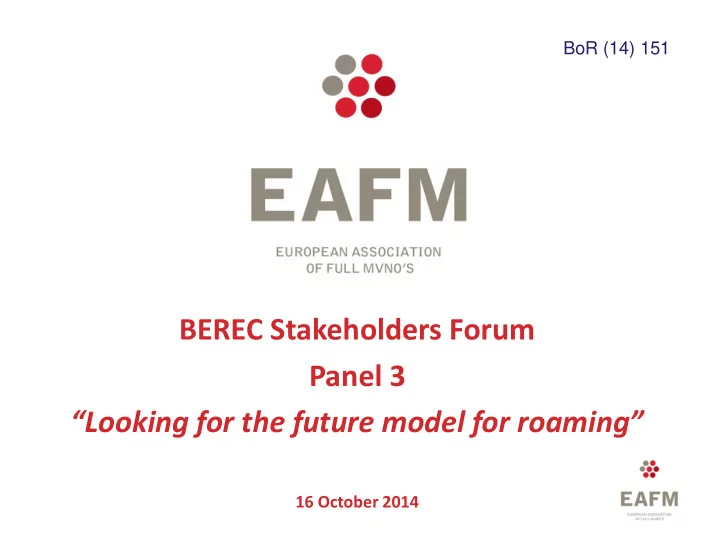

BoR (14) 151 BEREC Stakeholders Forum Panel 3 “Looking for the future model for roaming” 16 October 2014
MVNOs Are Important • > 10% of EU SIM cards; structural remedy for MNO mergers • MVNOs increase competition with innovative offers • large data allowances, unlimited SMS/off-net calls, new forms of bundling for domestic services • address specific market with convergent offers – fixed-mobile services – offer linking retailer loyalty program – offers for elderly people – offers focusing on data usage (broadband or M2M) • Security wireless services • inclusion of roaming destinations in retail bundles and multi- country/multi-number offers • MVNOs avoid costly multiplication of network assets and provide additional wholesale revenues for MNOs 2
EAFM • European Association of Full MVNOs which are: • Independent in terms of ownership and control from MNOs • Have full control of their service offerings • Maintain their own core network 1
RLAH (Roam Like at Home) Policy Objective • EAFM members agree with the policy objective to enable ‘roam like at home’ , if : • It does not reduce competition • It is not exclusionary • It is not damaging to users of mobile services in the EU • EAFM members want to offer RLAH retail bundles 4
Major concerns • EC proposal does not take into account that MVNOs account for around 10% of the market. No impact assessment has been done for MVNOs • EC intends to regulate retail rates by imposing RLAH without regulating wholesale rates. • That is not consistent especially with all the potential risk implied (competition distortion, waterbed effect ….) • Italian presidency: no provision for review of wholesale caps prior to entry into force of RLAH • What makes it worse for Full MVNOs is that they have no bargaining power to negotiate wholesale roaming charges in bilateral/multilateral context 5
EAFM Agrees with BEREC on Ability to offer RLAH for ALL Providers and it must include Full MVNOs 6
EAFM Agrees with BEREC on Sustainability need and it must include Full MVNOs • EAFM also agrees with BEREC on: • Timing: wholesale caps need to be reduced before RLAH is introduced + RLAH implementation time needed (wholesale at least 6 months prior to retail) • Abolition of decoupling (Single IMSI and LBO) • There is also a need for real MTR harmonisation before implementing RLAH 7
Impact of No Wholesale Roaming Charges regulation • Without material reduction of wholesale roaming charges, Europe will face: • Competitive distortion - eviction of Full MVNOs from the roaming market - risk of eviction of Full MVNOs from their domestic market(s) on account of inability to compete with MNOs offering RLAH - only bilateral/multilateral MNO alliances which can trade below regulated caps would be able to offer RLAH • Higher overall retail pricing for consumers (waterbed effect in home country*) including for RLAH, driven by high wholesale roaming costs * BEREC’s suggestion of waterbed effect in visited country requires detailed assessment and debate 8
Wholesale Caps Reduction prior to RLAH • To be able to offer RLAH, MVNOs need roaming wholesale rates in line with domestic wholesale rates • A coalition incl. EAFM has been discussing new wholesale cap for the next few years in order to reach levels that are in line with the domestic MVNO wholesale access rates. • However discussions between members reveal variations from country to country that would create market distortions This reduction of caps is agreed by important challenger MNOs and other MVNOs 9
Arbitrage Concerns • Excessive wholesale charges (or ensuring that wholesale roaming caps do not influence domestic MVNO access charges) are NOT a solution excessive wholesale charges distort competition in favour of the largest operator groups withhold roaming benefits from end-users, and may cause domestic prices to rise • Example of MVNO targeting the low-end of the market • Permanent roaming needs to be addressed/prevented by Fair Use Policy however this should be simple and not generate important IT systems development work for operators 10
Issues around Fair Use • Fair use criteria are in debate • If wholesale roaming caps are +/- aligned with domestic MVNO wholesale charges, Fair Use criteria may not be necessary AT ALL • EAFM is not convinced that detailed Fair Use rules (going beyond principles) can workably be determined at EU level • Detailed fair use criteria do not align with the philosophy of transparent retail pricing. • This would likely create distrust and disputes between end-users and operators • Moreover this will generate high IT development costs • Mobile operators with the most progressive offers may be forced to curtail their existing domestic retail offers to adapt to the economic impact of RLAH 11
Contact Jacques Bonifay, EAFM Chair Via Morgane Taylor – EAFM secretariat morgane@eafm.eu +32 2 550 41 10 www.eafm.eu 12
Recommend
More recommend